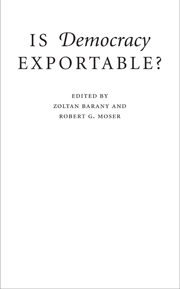Democracy and the Politics of Electoral System Choice
Engineering Electoral Dominance
$41.99 (C)
- Author: Amel Ahmed, University of Massachusetts, Amherst
- Date Published: January 2015
- availability: Available
- format: Paperback
- isbn: 9781107484139
$
41.99
(C)
Paperback
Other available formats:
Hardback, eBook
Looking for an examination copy?
If you are interested in the title for your course we can consider offering an examination copy. To register your interest please contact [email protected] providing details of the course you are teaching.
-
Amel Ahmed brings new historical evidence and a novel theoretical framework to bear on the study of democratization. Looking at the politics of electoral system choice at the time of suffrage expansion among early democratizers, she shows that the electoral systems used in advanced democracies today were initially devised as exclusionary safeguards to protect pre-democratic elites from the impact of democratization and, particularly, the existential threat posed by working class mobilization. The ubiquitous use and enduring nature of these safeguards calls into question the familiar picture of democracy moving along a path of increasing inclusiveness. Instead, what emerges is a picture that is riddled with ambiguity, where inclusionary democratic reforms combine with exclusionary electoral safeguards to form a permanent part of the new democratic order. This book has important implications for our understanding of the dynamics of democratic development both in early democracies and in emerging democracies today.
Read more- Links historical democratization to contemporary democratization, providing new avenues for theorizing about democracy
- Offers a historically grounded approach to understanding the origins of democratic institutions which will appeal to those who prefer to see process-tracing, rather than statistical analysis
- Features four in-depth cases studies: the United Kingdom, France, the United States, Belgium
Awards
- Winner of the 2014 Best Book Award, European Politics and Society Section, American Political Science Association
Reviews & endorsements
"By focusing on the strategies and motives of pre-democratic political elites, Ahmed’s comparative analysis sheds new light on the determinants of electoral reform in early democratizers. Her study shows how the careful reconstruction of the politics behind key institutional choices can provide significant insights into the process of democratization as a whole. This book breaks new theoretical and empirical ground, and will constitute important reading for scholars of democratization in all periods."
Giovanni Capoccia, Professor of Comparative Politics, University of OxfordSee more reviews"Democracy and the Politics of Electoral System Choice investigates the political origins of democracy in the nineteenth century. In a fascinating twist on politics-as-strange-bedfellows, Amel Ahmed finds that economic elites supported democratic electoral institutions to safeguard their own positions in the new democratic order. This wonderful, counter-intuitive, myth-busting book holds crucial lessons both for students of institutional analysis and for those who care about the abysmal performance of party politics in the post-industrial age."
Cathie Jo Martin, Professor of Political Science, Boston University, and former chair, Council for European Studies"In this comparative analysis of the evolution of electoral institutions in Belgium, Britain, France, and the United States, Amel Ahmed pushes forward the agenda of 'historicizing' the study of democratization. The result is an argument that rethinks these crucial cases but also has a broader lesson: methods of exclusion and containment rather than being antithetical to democracy may, historically, have been at the heart of democracy itself. This provocative and important insight should be taken seriously by scholars of contemporary authoritarianism and democracy as well as by students of political institutions more generally."
Daniel Ziblatt, Professor of Government, Harvard UniversityCustomer reviews
Not yet reviewed
Be the first to review
Review was not posted due to profanity
×Product details
- Date Published: January 2015
- format: Paperback
- isbn: 9781107484139
- length: 242 pages
- dimensions: 229 x 153 x 13 mm
- weight: 0.36kg
- contains: 2 b/w illus. 10 tables
- availability: Available
Table of Contents
1. Introduction: contradictions and ambiguities of democratization
2. Strategies of containment: the role of repression and accommodation
3. Strategies of competition: the logic of electoral system choice, single member plurality (SMP) vs. proportional representation (PR)
4. The United States: pre-industrial democratization and the origins of SMP
5. The United Kingdom: safeguarding the Reform Acts with SMP
6. France: the tumultuous path of electoral system choice in the Third Republic
7. Belgium: minimizing the existential threat with PR
8. Conclusions: rethinking democracy's determinisms
Appendix: the existential threat - electoral viability and ideological radicalism.
Sorry, this resource is locked
Please register or sign in to request access. If you are having problems accessing these resources please email [email protected]
Register Sign in» Proceed
You are now leaving the Cambridge University Press website. Your eBook purchase and download will be completed by our partner www.ebooks.com. Please see the permission section of the www.ebooks.com catalogue page for details of the print & copy limits on our eBooks.
Continue ×Are you sure you want to delete your account?
This cannot be undone.
Thank you for your feedback which will help us improve our service.
If you requested a response, we will make sure to get back to you shortly.
×





